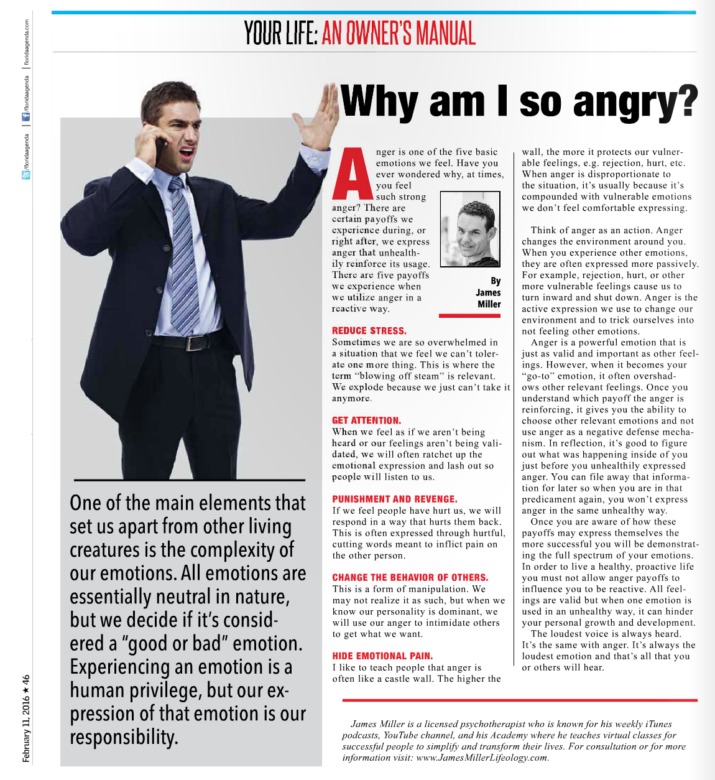One of the main factors that set us apart from other living creatures is the complexity of our emotions. All emotions are neutral, but we decide if it’s considered a “good or bad” feeling. Experiencing an emotion is a human privilege, but our expression of that emotion is our responsibility.
Anger is one of the six basic emotions we feel. Have you ever wondered why, at times, you feel such intense anger? There are certain payoffs we experience during, or right after, we express anger. These payoffs reinforce us to continually use anger in an unhealthily way
There are five payoffs we experience when we reactively use anger.
- Reduce stress. Sometimes we are so overwhelmed in a situation that we feel we can’t tolerate one more thing. This is where the term “blowing off steam” is relevant. We explode because we can’t take it anymore.
- Get attention. When we feel we aren’t heard or our feelings aren’t validated, we often ratchet up the emotional expression and lash out so people will listen to us.
- Punishment and revenge. If we feel people have hurt us, we will respond in a way that hurts them back. This is often expressed through hurtful, cutting words meant to inflict pain on the other person.
- Change the behavior of others. This is a form of manipulation. We may not realize it as such, but when we know our personality is dominant, we will use our anger to intimidate others to get what we want.
- Hide emotional pain. I like to teach people that anger is often like a castle wall. The higher the wall, the more it protects our vulnerable feelings, e.g., rejection, hurt, etc. When anger is disproportionate to the situation, usually it’s because it’s connected with vulnerable emotions that we don’t feel comfortable expressing.
Think of anger as an action. Anger changes the environment around you. When you experience other emotions, they are expressed passively. For example, rejection, hurt, or other, more vulnerable feelings cause us to turn inward and shut down. Anger is the active expression we use to change our environment and to trick ourselves into not feeling other emotions.
Anger is a powerful emotion that is just as valid and important as other feelings. However, when it becomes your “go-to” emotion, it often overshadows different relevant feelings. Once you understand which payoff the anger is reinforcing, it gives you the ability to choose other relevant emotions and not use anger as a negative defense mechanism. In reflection, it’s good to figure out what was happening inside of you just before you unhealthily expressed anger. You can file that information away for later, so when you are in that predicament again, you won’t express anger in the same unhealthy way.
Once you are aware of how these payoffs may express themselves, the more successful you will be demonstrating the full spectrum of your emotions. To live a healthy, proactive life, you must not allow anger payoffs to influence you to be reactive. All feelings are valid, but when one emotion is used in an unhealthy way, it can hinder your personal growth and development.
The loudest voice is always heard. It’s the same with anger, it’s always the loudest emotion, and that’s all that you or others will hear.
James Miller is a licensed psychotherapist and the executive producer and host of the nationally broadcasted and syndicated radio show James Miller | LIFEOLOGY®. For more information visit www.JamesMillerLIFEOLOGY.com and LIFEOLOGY.tv.


 We all get overwhelmed and sometimes don’t know what to do. LIFE LESSONS is your new “go-to” book to help you navigate life.
We all get overwhelmed and sometimes don’t know what to do. LIFE LESSONS is your new “go-to” book to help you navigate life.